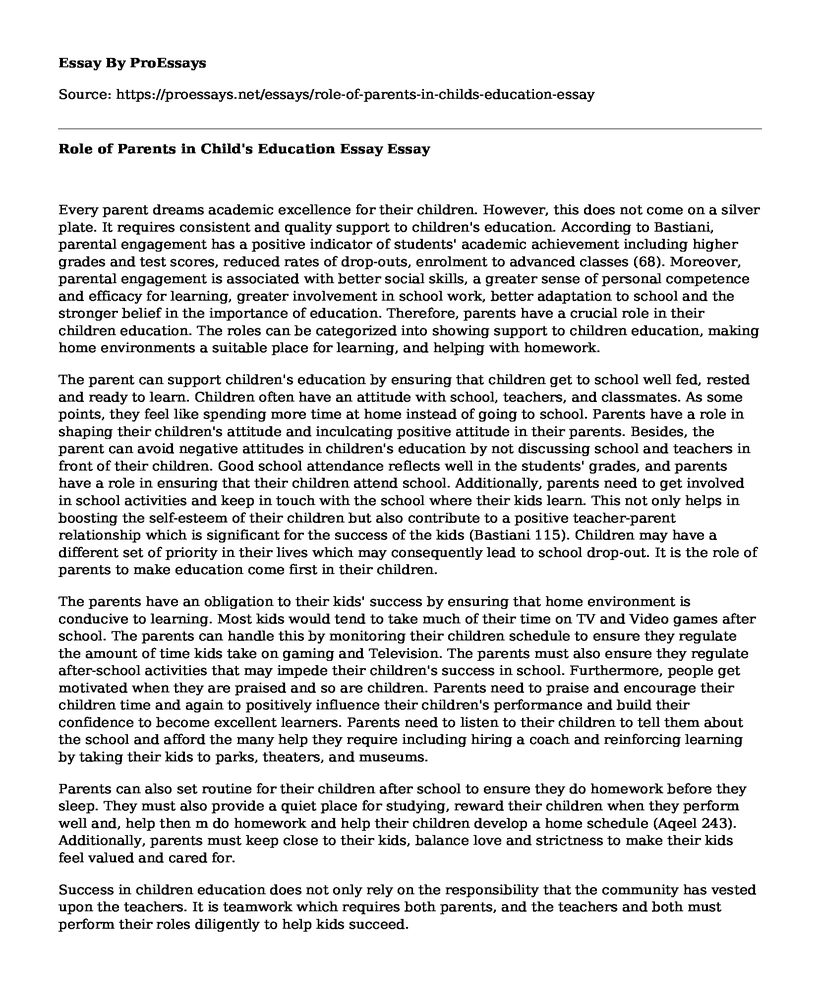Every parent dreams academic excellence for their children. However, this does not come on a silver plate. It requires consistent and quality support to children's education. According to Bastiani, parental engagement has a positive indicator of students' academic achievement including higher grades and test scores, reduced rates of drop-outs, enrolment to advanced classes (68). Moreover, parental engagement is associated with better social skills, a greater sense of personal competence and efficacy for learning, greater involvement in school work, better adaptation to school and the stronger belief in the importance of education. Therefore, parents have a crucial role in their children education. The roles can be categorized into showing support to children education, making home environments a suitable place for learning, and helping with homework.
The parent can support children's education by ensuring that children get to school well fed, rested and ready to learn. Children often have an attitude with school, teachers, and classmates. As some points, they feel like spending more time at home instead of going to school. Parents have a role in shaping their children's attitude and inculcating positive attitude in their parents. Besides, the parent can avoid negative attitudes in children's education by not discussing school and teachers in front of their children. Good school attendance reflects well in the students' grades, and parents have a role in ensuring that their children attend school. Additionally, parents need to get involved in school activities and keep in touch with the school where their kids learn. This not only helps in boosting the self-esteem of their children but also contribute to a positive teacher-parent relationship which is significant for the success of the kids (Bastiani 115). Children may have a different set of priority in their lives which may consequently lead to school drop-out. It is the role of parents to make education come first in their children.
The parents have an obligation to their kids' success by ensuring that home environment is conducive to learning. Most kids would tend to take much of their time on TV and Video games after school. The parents can handle this by monitoring their children schedule to ensure they regulate the amount of time kids take on gaming and Television. The parents must also ensure they regulate after-school activities that may impede their children's success in school. Furthermore, people get motivated when they are praised and so are children. Parents need to praise and encourage their children time and again to positively influence their children's performance and build their confidence to become excellent learners. Parents need to listen to their children to tell them about the school and afford the many help they require including hiring a coach and reinforcing learning by taking their kids to parks, theaters, and museums.
Parents can also set routine for their children after school to ensure they do homework before they sleep. They must also provide a quiet place for studying, reward their children when they perform well and, help then m do homework and help their children develop a home schedule (Aqeel 243). Additionally, parents must keep close to their kids, balance love and strictness to make their kids feel valued and cared for.
Success in children education does not only rely on the responsibility that the community has vested upon the teachers. It is teamwork which requires both parents, and the teachers and both must perform their roles diligently to help kids succeed.
Works Cited
Aqeel, Muhammad, et al. "Perceived Parental School Involvement and Problems Faced by Students: Comparison of Truant and Punctual Students." Pakistan Journal of Psychological Research 31.1 (2016): 241.
Welt, Christian Alexander. "Influence of Parents' Involvement on Children's Education: A Study of Tertiary Education in European Countries." (2015).
Bastiani, John. "Parents as partners: genuine progress or empty rhetoric?." Parents and Schools (1993). Routledge, 2018. 101-116.
Whalley, Margy, ed. Involving Parents in Their Children's Learning: A Knowledge-Sharing Approach. Sage, 2017.
Cite this page
Role of Parents in Child's Education Essay. (2022, May 09). Retrieved from https://proessays.net/essays/role-of-parents-in-childs-education-essay
If you are the original author of this essay and no longer wish to have it published on the ProEssays website, please click below to request its removal:
- Course Work on Teaching: Case Study of Jon's Social Development
- Alyanz Nasser: Personal Statement
- Gender Differences and Household Labor Essay
- School Medical Care: Protecting At-Risk Children - Essay Sample
- Essay Example on Infants of Depressed Moms: Effects of Maternal Depression and Antidepressants
- Paper Sample on Ending Injustice and Abuse of Human Rights: A Call to Uphold Equality
- Free Paper Sample on Caries Risk and Primary Dentition in Children







